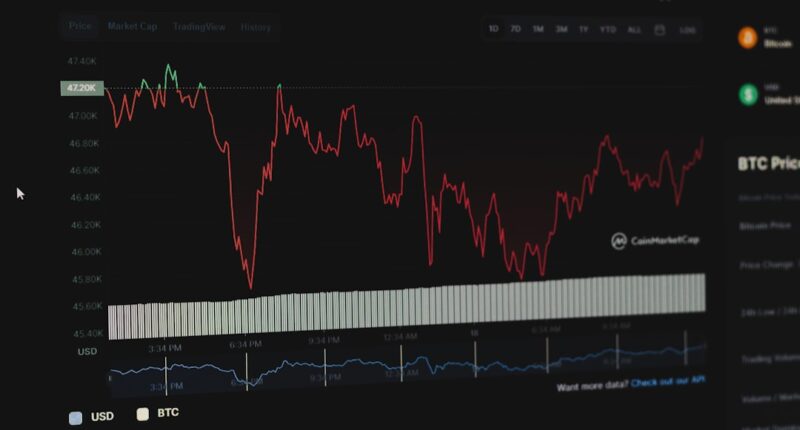Ethereum, launched in 2015 by Vitalik Buterin and a team of developers, represents a significant evolution in the realm of blockchain technology. Unlike Bitcoin, which primarily serves as a digital currency, Ethereum is a decentralized platform that enables developers to build and deploy smart contracts and decentralized applications (dApps). This flexibility has made Ethereum the backbone of numerous innovations in various sectors, including finance, supply chain management, and gaming.
The Ethereum blockchain operates on a public ledger system, where transactions are recorded in a transparent and immutable manner. This foundational aspect of Ethereum not only facilitates trust among users but also raises critical questions about data privacy. The architecture of Ethereum is built on the principles of decentralization and transparency, which are often at odds with the need for data privacy.
In a world increasingly concerned with data breaches and privacy violations, the challenge lies in balancing the open nature of blockchain technology with the necessity for confidentiality. As organizations and individuals begin to recognize the potential of Ethereum for various applications, understanding how data privacy can be maintained within this framework becomes paramount. This article delves into the intricacies of data privacy on Ethereum’s blockchain, exploring its mechanisms, advantages, challenges, and future developments.
Key Takeaways
- Ethereum is a decentralized blockchain platform that allows for the creation and execution of smart contracts and decentralized applications.
- Data privacy on the blockchain refers to the protection of sensitive information from unauthorized access and misuse.
- Ethereum plays a crucial role in enhancing data privacy through its use of cryptographic techniques and permissioned access.
- Using Ethereum’s blockchain for data privacy offers advantages such as transparency, immutability, and security.
- Challenges and limitations of data privacy on the Ethereum blockchain include scalability issues and the potential for privacy breaches.
Understanding Data Privacy on the Blockchain
Data privacy on the blockchain refers to the protection of sensitive information from unauthorized access while still leveraging the benefits of a decentralized ledger. In traditional databases, data privacy is often managed through centralized control mechanisms, such as firewalls and encryption protocols. However, blockchain technology operates differently; it is inherently transparent, meaning that all transactions are visible to anyone who has access to the network.
This transparency can be a double-edged sword: while it fosters trust and accountability, it also poses significant risks to personal and organizational data. To comprehend data privacy on the blockchain, one must first understand how data is stored and accessed. In a typical blockchain environment, each transaction is grouped into blocks that are linked together in chronological order.
Each block contains a cryptographic hash of the previous block, creating an immutable chain. While this structure ensures that data cannot be altered retroactively, it also means that any information recorded on the blockchain is permanent and publicly accessible. This permanence raises concerns about how sensitive information—such as personal identification details or proprietary business data—can be protected from prying eyes.
The Role of Ethereum in Enhancing Data Privacy

Ethereum has taken significant strides toward addressing data privacy concerns through various technological innovations. One of the most notable features is the introduction of smart contracts, which are self-executing contracts with the terms of the agreement directly written into code. Smart contracts can automate processes while ensuring that sensitive information remains confidential.
For instance, in a supply chain scenario, a smart contract could facilitate transactions between parties without revealing specific details about the goods being exchanged. This capability allows for greater operational efficiency while safeguarding sensitive data. Moreover, Ethereum has seen the development of privacy-focused protocols and tools designed to enhance data confidentiality.
Technologies such as zk-SNARKs (Zero-Knowledge Succinct Non-Interactive Arguments of Knowledge) allow for transactions to be verified without revealing any underlying data. This cryptographic technique enables users to prove that they possess certain information without disclosing what that information is. By integrating such technologies into its ecosystem, Ethereum is paving the way for more secure applications that prioritize user privacy while still benefiting from the advantages of blockchain technology.
Advantages of Using Ethereum’s Blockchain for Data Privacy
| Advantages of Using Ethereum’s Blockchain for Data Privacy |
|---|
| 1. Immutability |
| 2. Decentralization |
| 3. Transparency |
| 4. Security |
| 5. Smart Contracts |
Utilizing Ethereum’s blockchain for data privacy offers several compelling advantages that can significantly enhance how organizations manage sensitive information. One primary benefit is the decentralized nature of the network itself. Unlike traditional centralized systems where a single point of failure can lead to catastrophic data breaches, Ethereum’s distributed architecture means that data is stored across numerous nodes worldwide.
This decentralization reduces the risk of unauthorized access and enhances overall security. Another advantage lies in the transparency and immutability of transactions on the Ethereum blockchain. While these characteristics may seem counterintuitive to data privacy, they actually foster trust among users.
When individuals know that their transactions are recorded in an immutable ledger, they are more likely to engage with the platform confidently. Furthermore, smart contracts can be programmed to include specific privacy features that restrict access to sensitive information based on predefined conditions. This level of control allows organizations to tailor their data-sharing practices according to their unique privacy requirements.
Challenges and Limitations of Data Privacy on the Ethereum Blockchain
Despite its advantages, utilizing Ethereum’s blockchain for data privacy is not without challenges and limitations. One significant issue is the inherent transparency of public blockchains. While this transparency is beneficial for accountability and trust, it can also expose sensitive information if not managed correctly.
For example, if a user’s wallet address is linked to their identity, all transactions associated with that address become publicly visible. This potential for de-anonymization poses a significant risk for individuals and organizations seeking to protect their data. Additionally, scalability remains a pressing concern for Ethereum’s blockchain.
As more users engage with the network and more transactions are processed, the system can become congested, leading to slower transaction times and higher fees. This congestion can hinder the implementation of privacy-focused solutions that require quick processing times to be effective. Furthermore, while technologies like zk-SNARKs offer promising solutions for enhancing privacy, they also introduce complexity and computational overhead that can impact overall network performance.
Best Practices for Ensuring Data Privacy on Ethereum’s Blockchain

To effectively navigate the challenges associated with data privacy on Ethereum’s blockchain, organizations must adopt best practices tailored to their specific needs. One fundamental approach is to utilize pseudonymous wallet addresses rather than directly linking transactions to identifiable information. By maintaining a degree of separation between identity and transaction history, users can enhance their privacy while still participating in the network.
Implementing robust encryption techniques is another critical practice for safeguarding sensitive data on Ethereum’s blockchain. While transactions themselves are recorded transparently, organizations can encrypt specific data before it is submitted to the blockchain. This ensures that even if someone gains access to the transaction history, they will not be able to decipher the underlying information without the appropriate decryption keys.
Moreover, organizations should consider leveraging layer-2 solutions or private sidechains that operate alongside Ethereum’s mainnet. These solutions can provide additional layers of privacy by allowing transactions to occur off-chain while still benefiting from Ethereum’s security features when necessary. By adopting these strategies, organizations can create a more secure environment for managing sensitive information on Ethereum’s blockchain.
Future Developments in Data Privacy on Ethereum’s Blockchain
As Ethereum continues to evolve, ongoing developments promise to further enhance data privacy capabilities within its ecosystem. The transition from Ethereum 1.0 to Ethereum 2.0 introduces significant improvements in scalability and security through its shift from proof-of-work (PoW) to proof-of-stake (PoS) consensus mechanisms. This transition not only aims to reduce energy consumption but also enhances transaction throughput, which could facilitate more efficient implementation of privacy-focused solutions.
Additionally, ongoing research into advanced cryptographic techniques holds great potential for improving data privacy on Ethereum’s blockchain. Innovations such as homomorphic encryption—allowing computations on encrypted data without needing to decrypt it—could revolutionize how sensitive information is handled within smart contracts. As these technologies mature and become integrated into Ethereum’s infrastructure, they will likely provide users with even greater control over their data while maintaining compliance with regulatory frameworks.
Furthermore, collaborations between developers and regulatory bodies will play a crucial role in shaping the future landscape of data privacy on Ethereum’s blockchain. As governments around the world grapple with issues related to digital privacy and security, establishing clear guidelines will be essential for fostering innovation while protecting user rights.
The Impact of Ethereum’s Blockchain on Data Privacy
The impact of Ethereum’s blockchain on data privacy is profound and multifaceted. As organizations increasingly turn to decentralized solutions for managing sensitive information, understanding how to navigate the complexities of data privacy within this framework becomes essential. While challenges remain—particularly concerning transparency and scalability—the advantages offered by Ethereum’s architecture provide a solid foundation for developing innovative privacy solutions.
As we look toward the future, ongoing advancements in cryptographic techniques and network improvements promise to enhance user privacy further while maintaining the core principles of decentralization and transparency that define blockchain technology. By embracing best practices and staying informed about emerging developments, organizations can leverage Ethereum’s capabilities to create secure environments for managing sensitive data in an increasingly digital world.
A related article to How Ethereum’s Blockchain Is Enhancing Data Privacy can be found in the link Hello World: A Beginner’s Guide to Ethereum. This article provides a comprehensive overview of Ethereum and its potential applications in various industries. It discusses the basics of blockchain technology, smart contracts, and decentralized applications, making it a valuable resource for those looking to learn more about Ethereum and its capabilities.
FAQs
What is Ethereum’s blockchain?
Ethereum’s blockchain is a decentralized, open-source platform that enables developers to build and deploy smart contracts and decentralized applications (dApps).
How does Ethereum’s blockchain enhance data privacy?
Ethereum’s blockchain enhances data privacy through the use of cryptographic techniques and decentralized storage. Smart contracts and dApps can be designed to ensure that sensitive data is only accessible to authorized parties.
What are some specific features of Ethereum’s blockchain that contribute to data privacy?
Some specific features of Ethereum’s blockchain that contribute to data privacy include encryption, permissioned access, and the ability to create private transactions and contracts.
How does Ethereum’s blockchain compare to other blockchain platforms in terms of data privacy?
Ethereum’s blockchain is often seen as more flexible and customizable compared to other blockchain platforms, allowing developers to implement specific data privacy measures tailored to their needs.
What are some potential use cases for Ethereum’s blockchain in enhancing data privacy?
Potential use cases for Ethereum’s blockchain in enhancing data privacy include secure data sharing, identity management, supply chain transparency, and confidential transactions in financial services.





